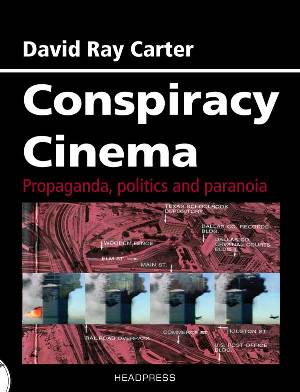This is a good read and a funny, sometimes enlightening book if not one to be undertaken in an afternoon.
This is a good read and a funny, sometimes enlightening book if not one to be undertaken in an afternoon.

(Headpress)
David Ray Carter has decided to tackle the ever-evolving genre of Conspiracy Cinema as a subject of serious review. That he has written a funny, readable book that manages to be both open minded and level headed is a considerable achievement but in many ways it needs to be. Because this could have been an excruciating read. Really. Think on: a whole load of conspiracy films with nothing in between to leaven the load.
Mr. Carter is at pains to point out that his brief excludes many You Tube films and streams, concentrating on those also released on DVD or at the flicks – doubtless a wise decision given the avalanche of other material that is out there; after all why muddy the waters further when what the novice needs is some form of hand holding? Regardless of the omissions (including Michael Moore but then, we’ve all seen enough of him elsewhere) this is still something of a slog despite the ever present dry humour and skilled reviews.
Let’s get the disappointing bits over first. The main fault of Conspiracy Cinema is the overall narrative structure: yes I do understand it is a book of reviews but I do feel that a brief history or some kind of timeline as regards the provenance of conspiracy cinema would have been extremely useful, if only to let our attention wander, and, thus refreshed, return for more claims of aliens running the world. We get one line on page 256 for example; “put simply, The Capitalist Conspiracy is the genesis point for modern Conspiracy Cinema and perhaps even a good deal of conspiracy theory itself”: oh for more enlightenment or discussion on this point.
As it is the book splits broadly into sections dealing with (amongst other things) the assassinations and attempts on heads of state and important political figures – Kennedy, Diana, Luther King, Lincoln et al, the rise of organisations such as the Illuminati and the New World Order and “classic” cover ups such as the Moon Landing and 9/11. Now and again we get the odd curveball health or financial conspiracy, (which happen, incidentally, to be some of the most interesting sounding films in Conspiracy Cinema).
Carter also goes for the classic reviewer’s line of reviewing the work above all, all fine and dandy and something to be applauded, but in a world of uncovering shady plots surely half the battle is being convinced by the work’s makers? Carter may be able to see at a glance whether these people pass muster, but Joe Reader won’t by just reading this tome. It’s a shame – as personally I would love to see a fuller portrait of Bill Still, or Alex Jones for example as he sounds a right case.
Still, let’s not moan too much. This is a good read and a funny, sometimes enlightening book if not one to be undertaken in an afternoon. Carter’s reviews do stimulate interest, and he must be applauded for the skill he shows in controlling the pace of his book, which never looks to sensationalize or confuse. This undemonstrative style of Carter’s does allow the reader to form questions of their own: one thing that does strike you is the fact that outside of the Nazis, the British Royal Family, “Islam”, and a whole host of other (predictable) US bugbears – you wonder at times what role the rest of the world plays in all this, maybe this thought alone could encourage us all to move to Belgium or New Zealand where we can be safely left alone by destructive loonies. In one tremendous paragraph from the review of Agenda: Grinding America Down, Mr. Carter lists the world’s ills: “Over the course of the film, Bowers and commentators describe the structure of the Communist hierarchy and their agenda using a flow chart system. By the midpoint this chart is a veritable octopus linking all of America’s ills per the film. Lines connecting Karl Marx, the KGB, the National Organisation for Women, the National Endowment for the Arts and illegal immigration show the viewer how practically every aspect of America in 2010 is the realization of the Communist agenda.”
There are fascinating byways to be mulled over here, and Carter’s book allows us to view this topic at a slight remove… You could note the peculiarly American blend of trepidation reminds this reviewer of Rip Van Winkle or Algernon Blackwood’s tales – such as the Wendigo or the works of Nathaniel Hawthorne – where the fear of a vast unknown and the awe at the power of the earth needs to be given some form so that a (victorious) struggle can take place.
Further plus points are the entertaining forewords by Thomas McGrath and the Deviants’ Mick Farren and – of course the appetite whetted for checking out interesting-sounding films such as the aforementioned The Capitalist Conspiracy, Dark Secrets Inside the Bohemian Grove or Don’t Talk About the Weather.
